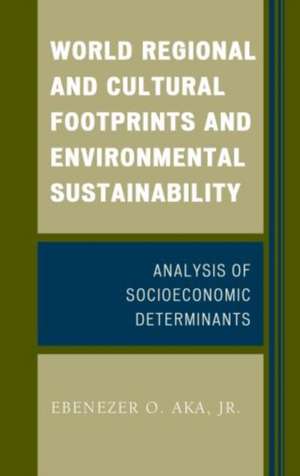World Regional and Cultural Footprints and Environmental Sustainability
Autor Ebenezer O.Jr Akaen Limba Engleză Hardback – 3 mai 2017
The book examines the issues of sustainability in general. It addresses various socioeconomic determinants of ecological footprints in different world's nations, regions, and cultures. Major socioeconomic determinants of ecological footprints are fleshed out using Comparative Model Analysis and rigorous Multiple Regression Analysis. The study exposes the inequitable distribution of the world's ecological footprints and also heightens the concern about ecological imbalances and overshoots. It explains how sustainable development can be promoted and achieved in regional, national, and local jurisdictions. The study provides information that will likely help various governments and policy-makers determine if a given nation, region, or culture is on a sustainable path. It helps government leaders, planners, policy-makers, and even students of sustainability make a difference in mitigating the effects of various environmental stressors. If this book makes people and policy-makers in different countries, regions, and cultures think globally but act locally, then the objectives are well-served.
Preț: 610.75 lei
Preț vechi: 793.18 lei
-23% Nou
116.88€ • 120.75$ • 97.28£
Carte tipărită la comandă
Livrare economică 26 martie-09 aprilie
Specificații
ISBN-10: 076186864X
Pagini: 350
Dimensiuni: 152 x 229 x 27 mm
Greutate: 0.66 kg
Editura: Rowman & Littlefield
